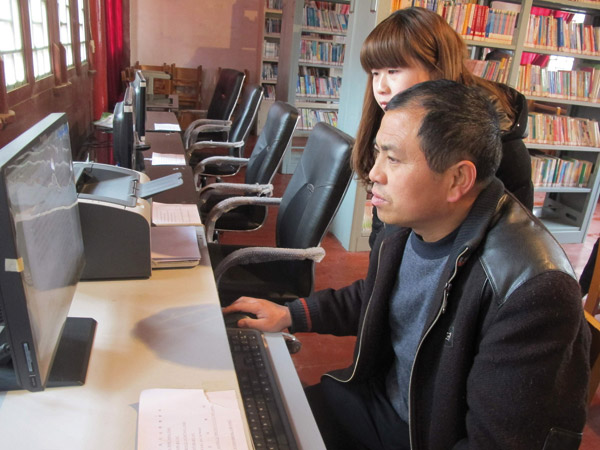From citizen to netizen
Updated: 2012-03-28 10:33
By Wang Kaihao (China Daily)
|
|||||||||||
 |
|
Ying Kuiming, a farmer from Toubao village, Guiyang, at the village's book house searching the digital library for technical guidance. Wang Kaihao / China Daily |
An online database in Guizhou province is revolutionizing learning for masses of people. Wang Kaihao reports in Guiyang.
When Zhu Hu, a 22-year-old undergraduate from Guizhou Normal College, in Guiyang, prepares for the national graduate school entrance exam, he plans to access for free an online thesis database with about 1.4 million articles.
"Our school doesn't have abundant digital resources," Zhu says. "I can download lots of academic lectures here."
The database is a part of the "Guizhou Digital Library," founded by the Guizhou Provincial Library in 2009.
Zhu logs on to the website every day, partly because it has articles and videos on a range of other subjects too.
"I am a fan of Peking Opera, but we have few opportunities to see performances here. So, I often log into the digital library to watch videos."
Liu Mei, the deputy curator of the provincial library, says 70 terabytes of resources are available, including 2.9 million digital books, 10,000 magazines, 90,000 video clips and numerous question banks for examinations.
Only people living in Guizhou can use the service as a local IP address determines visitor eligibility. All a user requires is an account to log in to.
Guizhou is the only province in China to provide such an extensive public database.
Library statistics suggest the average annual expense on books in Guizhou is just 10 cents (2 US cents), and each person borrows just 0.2 of a book from public libraries.
"Based on the local economy and a lack of resources we decided to cooperate with the provincial government, but this is not likely to be very profitable," says Nan Hangwei, the manager of digital book provider Chaoxing for the project.
Nan says Chaoxing shares its database with more than 60 public libraries and college libraries around the country, but only offers a service to registered users.
More digital libraries are expected to mushroom nationwide.
An announcement from an annual national meeting in February for curators of provincial public libraries, suggests 17 provincial libraries and 131 municipal libraries will adapt the digital library format by the end of 2012.
Property rights are, however, a major concern for resource providers. Among the 2.9 million digital books available at the online library, 1.3 million can be wholly read, and the users can read some chapters, 50 pages at most, of the rest of the books.
Liu Mei, the deputy curator, reckons two thirds of the investment of 10 million yuan ($1.59 million) for the project was used to purchase copyrights.
She says more than 20 million people visited the digital library by the end of 2011 and 550,000 people logged onto the website in February.
"Many Guizhou people play mahjong in their spare time, so it is amazing to win back so many readers," she jokes.
More than 60 percent of Guizhou people live in the countryside. Liu thinks it's essential to promote the digital library to these people.
A project called "Farmland Book House" was co-initiated by the provincial government and the provincial library in 2011 to reach this demographic.
In a book house in Toubao village, on the outskirts of Guiyang, there is a printer and computer costing about 5,000 yuan, which is enough to connect villagers to the database.
Ying Kuiming, 48, from Toubao, raises pigs and grows red bayberries. Although some agricultural technicians give lectures once a month in the village, he wants more information.
"I come to the book house twice a week to search the digital library. It can offer technical guidance at any time."
Liu says there are 700 book houses in Guizhou, and this will rise to 20,000 around the province in the next five years.
In areas without Internet access computers preloaded with 10,000 digital books and updated content will be provided, Liu says.
Additionally, the digital library for mobile phone users was developed in 2011.
"You don't need a smart phone," Nan, the Chaoxing manager, explains. "As long as your phone can surf the Internet, you can enter the database."
"However, in some remote rural areas where the mobile phone 3G network is not that developed, charges can be prohibitive. We will consider this problem next."
Today's Top News
Rescuers race against time for quake victims
Telecom workers restore links
Coal mine blast kills 18 in Jilin
Intl scholarship puts China on the map
More bird flu patients discharged
Gold loses sheen, but still a safe bet
US 'turns blind eye to human rights'
Telecom workers restore links
Hot Topics
Lunar probe , China growth forecasts, Emission rules get tougher, China seen through 'colored lens', International board,
Editor's Picks

|

|

|

|

|

|





